|
|
|
Sort Order |
|
|
|
Items / Page
|
|
|
|
|
|
|
| Srl | Item |
| 1 |
ID:
153138
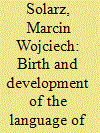

|
|
|
|
|
| Summary/Abstract |
The 1940s saw an intensification of worldwide interest in the problems of development and underdevelopment. One consequence of this was a rapid evolution of the language of global development. The reconstruction of its genesis is most commonly attempted through the analysis of literature on the subject and accounts by those who took part in or observed the debates of the time concerning the world’s development and structure. This article proposes a different approach which locates important events in the evolution of the modern language of global development on timelines tracing populational, political, socio-economic and civilisational processes.
|
|
|
|
|
|
|
|
|
|
|
|
|
|
|
|
| 2 |
ID:
180725
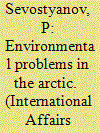

|
|
|
|
|
| Summary/Abstract |
THE FIRST mentions of the Arctic date back to the 4th century BC, during the development of sea navigation.1 The origins of the word "Arctic" stem from the Greek "ἀρκτικός" (pronounced "arktikos" and meaning "northern") and άρκτος ("bear," associated with the constellation Ursa Major). It refers to the lands located under this constellation. This physical and geographical region of the Earth, with climatic conditions that make it difficult to sustain life, is an integral part of the surface of the globe. Adjacent to the North Pole, it encompasses the circumpolar expanse whose inner radius includes the seas of the Arctic Ocean, its islands and archipelagos, as well as coastal territories of the surrounding three continents: Europe, Asia and North America.
|
|
|
|
|
|
|
|
|
|
|
|
|
|
|
|
| 3 |
ID:
106648
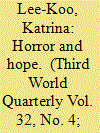

|
|
|
|
|
| Publication |
2011.
|
| Summary/Abstract |
This article examines the (re)presentations of militarised children in contemporary global politics. In particular, it looks at the iconic image of the 21st century's child soldier, the subject of which is constructed as a menacing yet pitiable product of the so-called new wars of the global South. Yet this familiar image is a small, one-dimensional and selective (re)presentation of the issues facing children who are associated with conflict and militarism. In this sense it is a problematic focal point for analysing the insecurity and human rights of children in and around conflict. Instead, this article argues that the image of the child soldier asserts an important influence in its effect upon global North-South relations. It demonstrates how the image of the child soldier can assist in constructing knowledge about the global South, and the global North's obligations to it, either through programmes of humanitarianism, or through war.
|
|
|
|
|
|
|
|
|
|
|
|
|
|
|
|
| 4 |
ID:
103512
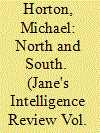

|
|
|
| 5 |
ID:
108552
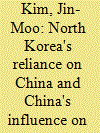

|
|
|
|
|
| Publication |
2011.
|
| Summary/Abstract |
North Korea's economic reliance on China has been increasing recently. China is
certainly North Korea's most important partner of political collaboration and
international mediator. The international community is paying close attention to
the possibility that China may bring North Korea under its outright control. It is
certain that North Korea's reliance on China will deepen further if its economic difficulties worsen or if there is a crisis in the regime. While the expansion of North
Korea-China economic relations may trigger a positive change in North Korea, it
might have a negative impact on the development of inter-Korea relations and the
settlement of issues related to North Korea's nuclear program.
|
|
|
|
|
|
|
|
|
|
|
|
|
|
|
|
| 6 |
ID:
139023
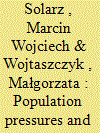

|
|
|
|
|
| Summary/Abstract |
This article examines the relationship between the populations of the more and less developed societies between the first century and 2100. Such an analysis reveals a changing dependency between the level of development (and GDP) achieved and population numbers between the first century and 1998. In relation to the past the article suggests a dynamic model for dividing the world into more and less developed areas. In relation to the present and the future it bases the population analysis on the developmental division of the world as published by one of the co-authors of this article. The article largely uses population estimates (with those referring to the past taken from Angus Maddison and those referring to the future from the most recent projections by the United Nations). Taking the 2013 UN projection as a model, it discusses three variants for demographic development in the North and South up to 2100. It argues that the more restrictive population growth variants of the UN projection predict a greater relative ‘Third Worldisation’ of the world than does the most dynamic projection.
|
|
|
|
|
|
|
|
|
|
|
|
|
|
|
|
| 7 |
ID:
101539
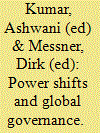

|
|
|
|
|
| Publication |
London, Anthem Press, 2010.
|
| Description |
xv, 359p.
|
| Standard Number |
9781843318316, hbk
|
|
|
|
|
|
|
|
|
|
|
|
Copies: C:1/I:0,R:0,Q:0
Circulation
| Accession# | Call# | Current Location | Status | Policy | Location |
| 055587 | 327.112/KUM 055587 | Main | On Shelf | General | |
|
|
|
|
| 8 |
ID:
123520
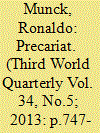

|
|
|
|
|
| Publication |
2013.
|
| Summary/Abstract |
The term 'precariat'-a precarious proletariat-has achieved considerable prominence in recent years and is probably now ripe for critical deconstruction. It also needs to be situated in terms of a genealogy that includes the marginality debates of the 1960s, the later informal sector problematic and the 'social exclusion' optic that became dominant in the 1980s. I will argue that the concept is highly questionable both as an adequate sociology of work in the North and insofar as it elides the experience of the South in an openly Eurocentric manner. In terms of political discourse I think we should avoid the language of 'dangerous class', as deployed by Guy Standing to situate workers politically in the policy world as though frightening the ruling classes was a strategy for transformation.
|
|
|
|
|
|
|
|
|
|
|
|
|
|
|
|
| 9 |
ID:
149249
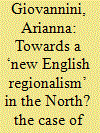

|
|
|
|
|
| Summary/Abstract |
Traditionally, the debate over English devolution has been framed by mainstream parties, favouring a top-down approach. However, this scenario has recently started to change, particularly in the areas with stronger regional identities such as the North of England. In 2014, the first regionalist party (Yorkshire First) was created, followed by the North East Party and the Northern Party. Such actors overtly challenge the narratives of regionalisation that have prevailed so far, and endorse bottom-up regionalism. This article offers the first analysis of these ‘new regional voices’ in the North, and seeks to assess emerging tensions between regionalisation and regionalism in the devolution debate. To achieve this, it concentrates on the case of Yorkshire First, drawing on documentary analysis and the results of a membership survey. It will be argued that, although still limited in its impact, the rise of Yorkshire First signals the presence of a political vacuum in the region which has been left open by mainstream politics, and that regional identity and territorial cleavages do matter in the current debate on devolution in the North of England.
|
|
|
|
|
|
|
|
|
|
|
|
|
|
|
|
|
|
|
|
|